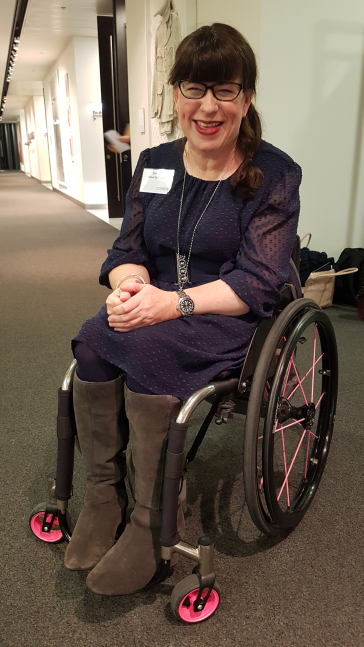Six months ago we launched an Accessibility Advisory Panel, whose purpose is to understand the potential impacts of our project on disabled people and to help our teams develop the most inclusive solutions for East West Rail (EWR). Mary Doyle, the panel’s co-chair, explains her aims for how EWR can lead the way for accessibility and inclusion.
This Sunday (3 December) is International Day of Persons with Disabilities, a United Nations initiative that aims to promote an understanding of disability issues and mobilise support for the dignity, rights and wellbeing of people with disabilities.
One in five people in the UK is disabled – and the variety of disabilities means that different people access and experience the railway in different ways. At East West Rail we subscribe to the social model of disability, which doesn’t use medical diagnosis as a basis but instead believes that people are disabled by the barriers that society creates which excludes them.

Mary Doyle, co-chair of Accessibility Advisory Panel
“When I was asked to join the panel, I said of course, as the opportunity to build a new railway in our lifetime is exciting,” said Mary, who retrained in 2016 and founded her business, Rocket Girl Coaching, to use her 20+ years of professional experience in the corporate world and her lived experience to improve inclusion and understanding in society through consultancy and disability equality training.
“I'm a rail user and it’s also in my family. My dad and brother spent 40 years with the London Underground, so getting to work with a rail project felt like a chance to follow in their footsteps.”
“There are 14 million disabled people in the UK yet just 250,000 disabled railcard holders. That's a big difference. We want to encourage more disabled people to use rail. Together, the Accessibility Advisory Panel and EWR aim to find solutions.”
On her goals for the panel, Mary continued: “I would like EWR to be a pioneer in accessibility, to set out the goals for what a railway should look like – a template for the future – to become an industry leader and others will have to rise to our inclusion standards, going way beyond the traditional compliance in rail. Disability has always existed and will always continue to exist, it's a part of the human experience. It could be a long-term condition, but it can also be situational. The disadvantages disabled people face can also be experienced by someone using one arm, to buy a ticket for example, because they’re holding a child. Or perhaps someone whose mobility is limited due to a leg injury. It affects everyone.

“The great thing about the panel is we have had several meetings and people are so committed. Solidarity and action are critical. And, if we keep that respect going – we'll do amazing work.”
We look forward to sharing further updates from the Accessibility Advisory Panel as the project progresses. More information on our approach to accessibility inclusion can be found here
